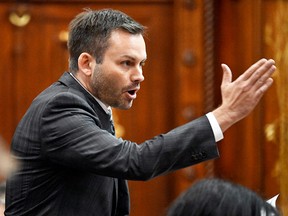
Appearing on Peterson’s podcast earlier this month, Poilievre said that if the separatist PQ is comfortably leading in the polls provincially, it’s because of Prime Minister Justin Trudeau. After all, he said, separatists “had been completely obliterated in the Harper era.”
“Separatism was completely dead in Quebec and now it’s making a resurgence and… the leader of the PQ has actually been making economic arguments in favour of separatism,” Poilievre said.
But because the Liberal government “has been such a colossal disaster for our national economy, the separatists are now able to make the argument that they would be better off separating from that calamity.”
For Paul St-Pierre Plamondon, known as PSPP, the remarks were too rich. He said Poilievre showed “a contempt for Quebec in a context where the independence movement is only (perceived as) a threat.”
“That’s all it comes down to. There is no will to understand. There is no will to give legitimacy to demands that are in fact identical in some respects to Canadian demands,” he said at a Jan. 7 press conference.
Poilievre always seems ready to advocate for Western Canada, St-Pierre Plamondon said. What, he demanded, would the Conservative leader, if elected prime minister, do for Quebec?
“The immediate future of Quebec in Canada, under a Pierre Poilievre government, does not bode well,” St-Pierre Plamondon said.
The two have been sparring back and forth ever since.
The Tory leader then went on the offensive, attacking the PQ leader. “You are afraid that a Conservative government will respect Quebec’s autonomy because it would undermine your arguments in favour of sovereignty,” he said.
Quebecers, who are accustomed to being wooed by political leaders, are still waiting for Poilievre to tell them what he plans to offer their province. His predecessors had proposals specifically for Quebec, and former federal Tory leader Erin O’Toole presented a “Quebec platform” in the 2021 election. Stephen Harper’s Conservative government even passed a motion in the House of Commons “that Quebecers form a nation within a united Canada.”
Poilievre says he believes in “responsible federalism,” while arguing that Harper’s approach shows Quebec gets more respect from Conservatives than it has during nine years of Liberal government. As prime minister, he said, “Quebecers will be winners.”
At least some Quebecers, it seems, have yet to be convinced.
“This is an initial position, but when he talks about ‘responsible federalism’, it is a new expression that his Conservative predecessors did not necessarily use. He will have to clarify his thinking in relation to what this can mean concretely for Quebec,” said Marc-André Leclerc, who was chief of staff for then Conservative leader Andrew Scheer.
St-Pierre Plamondon’s party won’t be on the ballot in the upcoming federal election, but because it’s polling as the most popular provincial party in Quebec, its leader has managed to get Poilievre’s attention, and perhaps under his skin, too.
He asked Poilievre if he would commit to legislating to prohibit federal spending power in areas of provincial jurisdiction, to stop challenging Quebec’s controversial Bill 21 restricting religious symbols for some public employees, to give Quebec full power over immigration to the province and over cultural spending in the province.
He hasn’t yet got an answer. Conservatives did not respond when National Post asked.
But that may work just fine for St-Pierre Plamondon, whose shadow boxing with Conservatives only improves his standing provincially, said Geneviève Tellier, political science professor at the University of Ottawa.
“It gives him an opponent against whom he knows he will score points because on certain issues Pierre Poilievre will have difficulty defending himself,” she said.
When the PQ dares the Conservative leader to stand with Quebec against multiculturalism, Poilievre can’t really win, said Tellier.
“But it would be difficult for him to say ‘oh no, no, I don’t like that.’ I mean, there is a consensus in Canada. So, there are certainly advantages for PSPP in asking to confront Poilievre,” she said.
St-Pierre Plamondon knows that separatist sentiment in Quebec isn’t exactly boiling over: it’s been stable for months at around 35 per cent. Yet the PQ hasn’t been this popular in decades — in large part because of the sinking fortunes of Legault’s Coalition Avenir Québec government. It may not last. Like Poilievre, PSPP is leading a popular opposition party that’s salivating for an election, scheduled in Quebec for next year.
By then, they could both find themselves in very different situations, said Leclerc.
“The two will have to work together, because even for Mr. St-Pierre Plamondon, if he wins the election, there will be no referendum two weeks later. He will have no choice but to work with the federal government, and he will have no choice but to gain things,” he said. “And that will involve collaborating with Pierre Poilievre.”
Our website is the place for the latest breaking news, exclusive scoops, longreads and provocative commentary. Please bookmark nationalpost.com and sign up for our newsletters here.